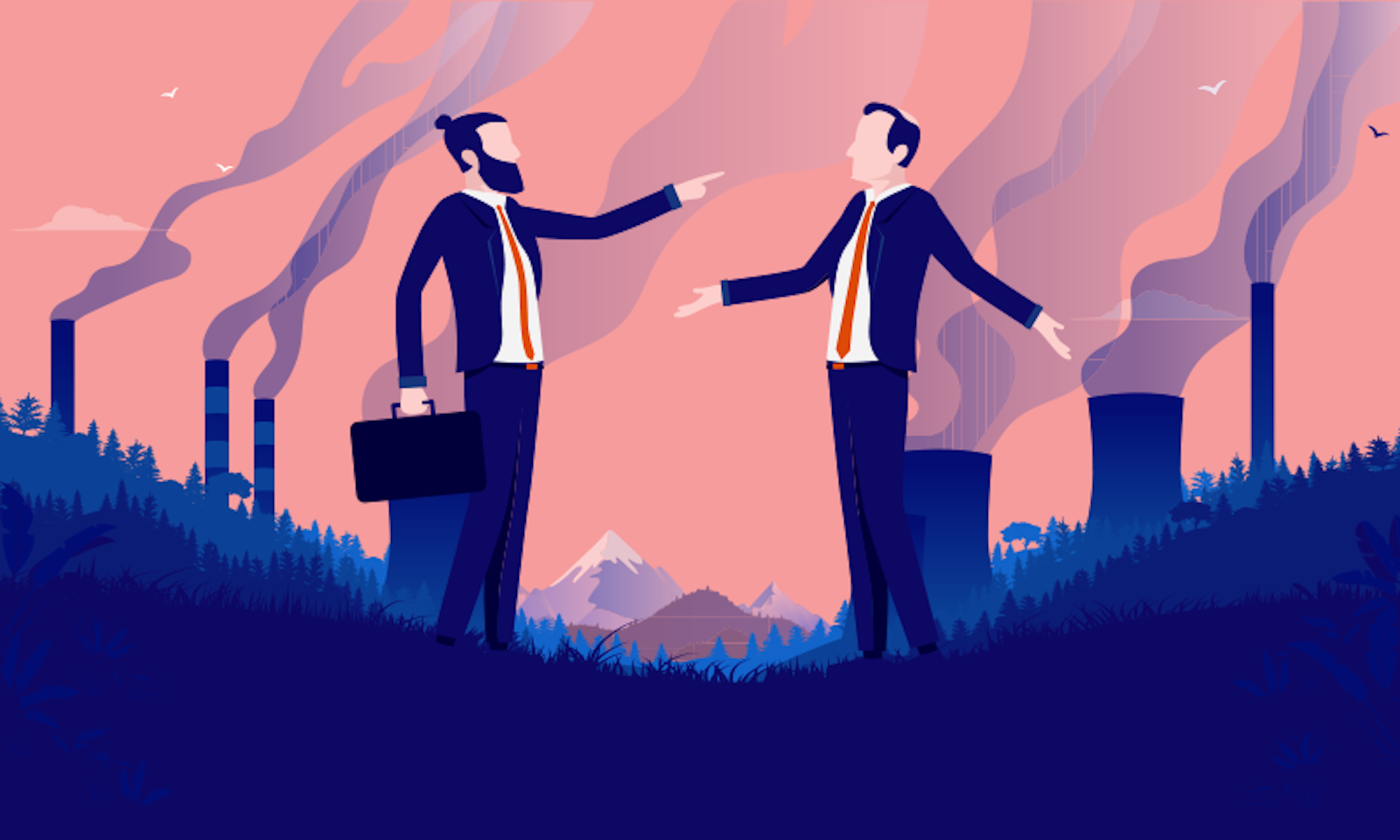Climate change is already a deadly threat to human life, from the 61,672 deaths recently attributed to heat in Europe in the summer of 2022 to this summer’s combination of devastating floods and forest-razing wildfires. Yet perhaps the scariest part is that if we don’t get warming under control, this is all likely to get worse. Research forecasts that, if current emissions continue, by 2050 damaging flooding will become 10 times worse in the United States, while global catastrophic wildfires will increase by a third. And dangerous heat waves are projected to become three to 10 times more common worldwide by the century’s end.
Who is to blame for allowing humanity to careen down this destructive path? This is the central question of The Great Transition, a new novel by Nick Fuller Googins. Googins’ novel is set in a “climate utopia” of the near future, in which labor movements and civil disobedience have pushed a world on the brink of disaster to net-zero emissions. Yet, in this imagined world, the so-called “climate criminals”—oil CEOs, lobbyists, and fossil-fuel financiers—walk free, radicalizing some characters to take extreme action.
The climate solution that science dictates we need is not even close to happening.
Googins wanted to make the pursuit of justice central to his story. “When justice has not been repaired, it festers,” Googins told Nautilus. “It’s made me think of justice as a human need, in the hierarchy of human needs.”
We spoke with Googins about what it could take to achieve climate utopia, why justice helps heal relationships, and what can happen if people feel justice hasn’t been served.
Civil disobedience is a theme through your work. When do you think it becomes necessary?
When systems fail regular working people. The political, economic systems are failing to meet the needs of so many now. With the climate crisis, the solution that science dictates we need is not even close to happening.
How did the world achieve net-zero emissions in your novel?
In this novel, it’s massive collective action that leads to change. The Department of Emergency Transition is created as a result of mass demonstrations, and the fictionalized Green New Deal goes into place. But the characters are seeing on the ground what often happens in reality: A bill is passed and sounds good, but doesn’t work. They see mismanagement and theft, and real change only comes when workers—from firefighters to janitors to truck drivers—take matters beyond scattered strikes and protests and seize control by refusing to work until the transition shifts to protect regular people.
That is where I see a lot of hope in the real world. Rather than a strike here or there, or an act of civil disobedience here or there, what would happen if the teamsters and the Service Employees International Union and the National Education Association all declared a general simultaneous strike until something like a version of the Green New Deal was passed?
Who is to blame for allowing humanity to careen down this destructive path?
Your main characters—the married couple Kristina and Larch Vargas—take opposing views about what is required for justice to be served. Tell me more about this.
Kristina and Larch both experienced terrible, unspeakable loss from the climate crisis and different climate catastrophes. For Kristina, that has crystallized clearly who’s responsible for this: the group of people who we would now call the “carbon majors,” the 100 organizations and corporations and state institutes responsible for something like 70 percent of emissions since the late 1980s. Her idea of justice is assassination: Justice will be served when the people who made these decisions no longer exist.
Her husband Larch represents this idea that retroactive justice isn’t going to help society. He doesn’t see the same necessity in Kristina’s strain of vengeance. He doesn’t feel like that will be cathartic for him. He’s moved on. That’s interesting to me, because it’s different for all of us: this question of—how much does the past affect our day-to-day lives?
What experiences did you draw from to portray what drives that behavior?
I did research into Israel after World War II, when Mossad created covert death squads that assassinated former SS officers. It was interesting to read the debates among politicians of the time: Some who thought it was a waste of resources, and others saying this has to be done, for justice, as a human need.
I also teach fourth grade and we use restorative justice in the classroom. When there’s been injury or harm, ideally you bring together the parties and talk it through. For the person who’s been harmed, they feel they have been heard and actions are being taken to repair the harm. And it’s transformative for the person who caused harm, to relieve themselves of guilt and express remorse, and actively work to make things right.
What are the stakes if justice isn’t achieved for the climate crisis?
We’re still experiencing one example right now. It goes back to the Great Recession, when a relatively small number of people in charge of banks made decisions that cost millions of Americans their savings and their homes, all in the name of profit. Not one banker was charged with a crime.
That injustice festered, and a lot of people believe that was a part of the rise of the Tea Party and right-wing populism. Leading, ultimately, to the election of Donald Trump, the insurrection, and a coin toss that he might win again.
When regular people don’t receive justice, it teaches everyone this implicit lesson that the government is not here to serve us. With more climate catastrophe, people are going to be scared—they are scared already—and will gravitate toward a demagogue who will claim to be able to solve the problem. ![]()
Lead image: Overearth / Shutterstock
































